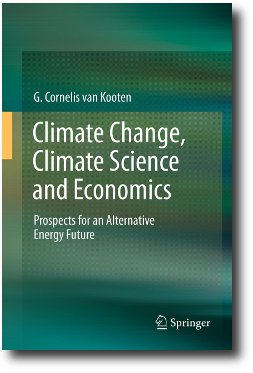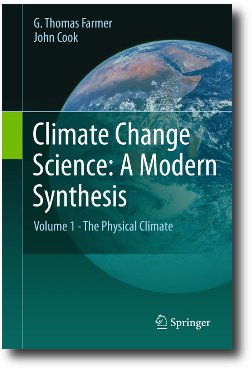 Bishop Hill
Bishop Hill A tale of two textbooks
 Feb 17, 2013
Feb 17, 2013  Books
Books  Climate: Sceptics
Climate: Sceptics  Climate: other
Climate: other Two new university level text books have hit the shelves, both coming from the Springer stable. I thought it rather interesting that the publisher had turned out two such contrasting takes on the climate debate almost simultaneously. Also, both books take interesting diversions from their main subject matter.

Cornelis van Kooten is a resource economist from the University of Victoria in Canada and his book is entitled Climate change, climate science and economics. Although Springer bill it as a research level text it's written in highly accessible fashion. The focus is very much on the economics, looking at emissions scenarios and climate models, cost-benefit analyses, impacts assessments, and the whole gamut of more or less sane policy responses. But the first few chapters focus on the science, with solid discussions of the temperature records and the paleoclimate studies, and with diversions into the discoveries of the blogosphere. Names familiar to those in the climate blogosphere abound: McIntyre and McKitrick, Watts, Mosher and even someone called Montford, who is cited more than once.
If I have a bone of contention it's with the price. I know academic books are expensive, but £100 pounds for an ebook? That is absurd and a wasted opportunity. Van Kooten's book feels to me like The Skeptical Environmentalist, both in tone and importance for the general reader. It should have been priced accordingly.
 Climate Change Science: A Modern Synthesis - Vol 1 The Physical Climate also has a diversion in an unexpected direction. The book is by Thomas Farmer and John Cook, the former an environmental consultant and the latter needing little introduction as the man behind Skeptical Science. Apparently the first in a multi-volume set, it focuses on the physical science, although it rather sets out its stall as a work of political advocacy by including in its introduction a section on the Hockey Stick controversy.
Climate Change Science: A Modern Synthesis - Vol 1 The Physical Climate also has a diversion in an unexpected direction. The book is by Thomas Farmer and John Cook, the former an environmental consultant and the latter needing little introduction as the man behind Skeptical Science. Apparently the first in a multi-volume set, it focuses on the physical science, although it rather sets out its stall as a work of political advocacy by including in its introduction a section on the Hockey Stick controversy.
It is directed at "the introductory science student who has perhaps not had a science course since secondary or preparatory school", and the early sections therefore cover things like the scientific method, before moving on to the meat of the text with section on the atmosphere, the oceans, climate models and so on.
The diversion is at the end of the book, where the authors take a diversion off into Lewandowsky territory: Part X is about "Climate Denial" and Part XI is on "Specific Declarations against Climate Science and Climate Scientists". I'm sure readers here can guess what this is like. This kind of activist talk sits extremely uncomfortably in a book that it is supposed to be about the physical climate, although I'm actually rather surprised to see this kind of thing in an academic work at all.
But let me close by noting one particularly interesting comparison between the two books. Farmer and Cook include considerable discussion of conspiracy theories - the word "conspiracy" appears more than a dozen times and "hoax" nine times. Lewandowsky's "unpublished" paper on conspiracy theories among "deniers" is cited approvingly.
Meanwhile, van Kooten's book doesn't mention "conspiracy" or "hoax" at all.
Doesn't that tell a story?



Reader Comments (23)
I wonder if there's any way to find out which institutions instruct their young enquiring minds to add either of the books to the required / recommended reading and for which courses?
Will Lewandowsky will return the favour?
Seeing things scuttle about after a stone was turned over at SkS by WUWT - Cook's integrity is shredded to anybody who sees the story.
And is the second book also £100?
'out too such contrasting takes on the climate'?
out two such contrasting takes on the climate (Para 1)
If you are publisher, I suppose you want to sell books to both sides in an argument.
G Thomas Farmer doesn't really add any scientific credentials to Cooky the Cartoonist's effort.
He is one of the Skeptical Science tree house gang - going by the handle of "rockytom".
http://www.skepticalscience.com/team.php
He also runs an environmental consultancy business in Las Cruces.
http://www.linkedin.com/pub/g-thomas-farmer/30/253/8a9
Anybody who pays seventy odd quid for their magnum opus needs their head examined.
http://www.amazon.co.uk/gp/product/9400757565/ref=as_li_ss_tl?ie=UTF8&camp=1634&creative=19450&creativeASIN=9400757565&linkCode=as2&tag=bishil-21
Yes
Springer is well known for its saucy pricing.
At Amazon you can read the opening pages of Cook's book. I couldn't copy from the protected PDF but have previously typed a few choice excerpts from the Foreward.
The grammar and errors ("satellites into space and orbit") suggest it's been written for beginners by beginners...
The Farmer Cook book offers derivative deceptive writing, just like the SkS blog.
What is surprising about a schlock blogger writing a schlock book?
"Most scientists are realists and their primary concern is for the best future for the humanity on this planet."
I don't need to read any further to know that the balance will be utter rubbish, too. What pretentious drivel!
"Climate change science" That title sums it all: climatology, climate science yes. Climate change science? BS
Springer did publish Leroux book in 2010... another level of knowledge about climate and meteorology!
John Cook writes on this further at the Conversation in a piece entitled -
There is no such thing as climate change denial
I've made a few comments under my full name mostly about their urge for the Conversation (a supposedly academic blog) to no longer publish any comments from "deniers".
Meanwhile the Australian Department of Climate Change and Energy Efficiency issues an urgent warning
I tweeted this on Jan 24:
'Springer' replied:
SpringerSBM is Springer Science and Business Media
I actually obtained access to a review copy of the Cook book. The denial etc chapters are extremely sketchy. They seem to be put together in haste. The chapters don't even address the far-out concepts they have all those pages available to do. Cook appears to have sacrificed whatever little intellect there was in that physicist head, in order to jump on to the psych bandwagon.
We can't even live IN the planet, that's like, the Morlock option gone too! This is really really bad, really.
@DaveA
You do us a great favour by giving us access to some of the more toe-cringing parts of the book. Enough perhaps to make a judgement.
It's news to me that
'Most scientists are realists and their primary concern is for the best future for the humanity on this planet'
Realists? - certainly that is the ideal.
Primary concern is the best future for the humanity on the planet? - that's 'sciency activism', not science.
'Scientists are among the best educated members of society and now is a great time to be a scientist because knowledge is expanding astronomically, in quantum leaps.'
I don't think the authors have the faintest idea about either astronomy or quantum mechanics ..(note that quanta are very very very small...that is why it took so long to figure out they were there at all).
This has the feel of the 'Boys and Girls Book of Gee Whizz Climatology' aimed at 10 year olds, rather than a serious contribution for even the most unschooled 'scientist'
To copy from protected pdfs use Evince.
Thanks GrantB for the link to Cook’s article in the Conversation. Extraordinary. He gives a definition of the term non sequitur for its intellectually challenged readers, then indulges in one to hammer home his point.
Then:I would say:
"Extreme weather events today are not more extreme or more frequent than extreme weather events of the past, hence it's unlikely that our emissions are responsible for more extreme weather today."
(the second bit was almost redundant)
Cook just made up his own mangled straw man and belted it down.
"the first in a multi-volume set"
A part-work, then. Does it come on a card with a bit of a windmill attached? Make a fully-working model, in only 72 parts...
As anonym notes above, I have always considered Springer as one of the most expensive publishers. They need to be more careful about their brand image.
Some authors only just manage to beat their strawman opponents thanks to repeated low blows - and then only on points (and in their own judgement).
Here's a typical alarmist, no straw man:
"Extreme weather events are happening now so they must be a result of climate change"